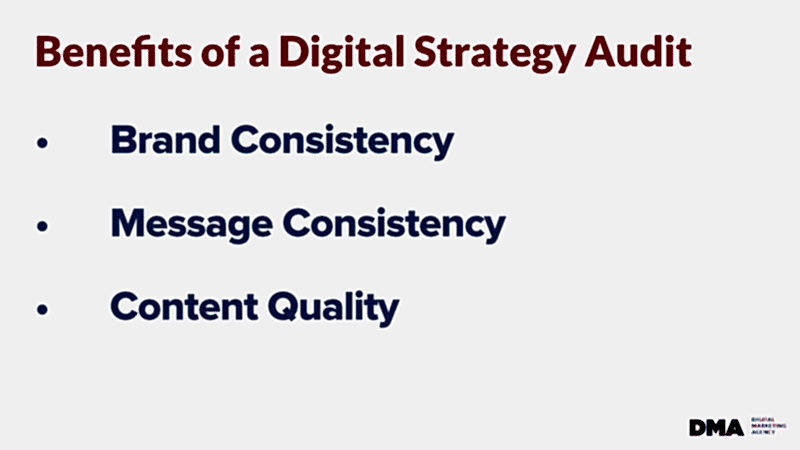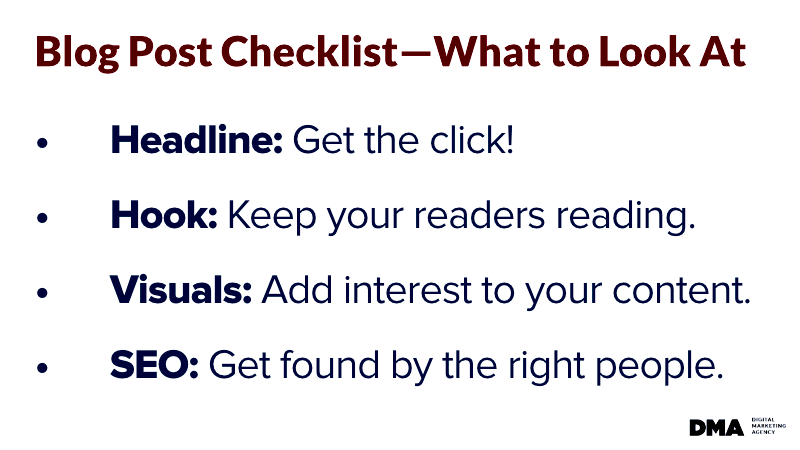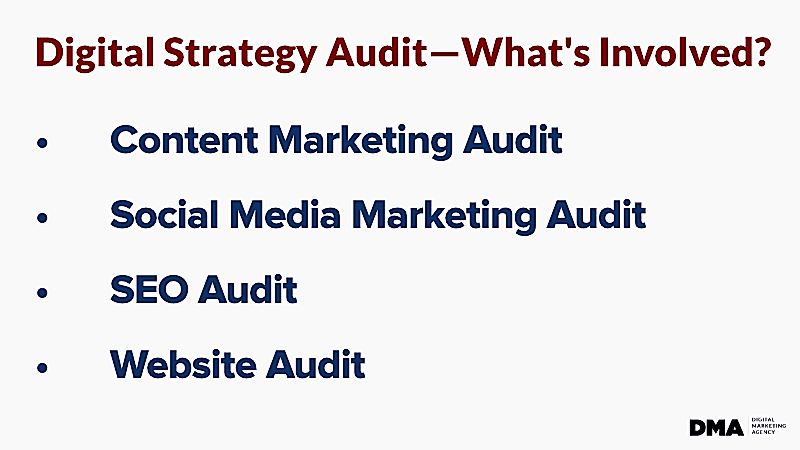SEO
Free SEO Analysis
SEO Services
Content Marketing Services
Local SEO
Link Building Services
Specialized SEO Services
PPC
REPUTATION MANAGEMENT
Free Reputation Management Analysis
Reputation Management Services
Review Management Services
Specialized Reputation Management Services
CEO Reputation Management
Brand Enhancement
Business and Directory Listings
Comprehensive Reputation Management Audit
SOCIAL MEDIA
Free Social Media Analysis
Specialized Social Services
WEB DEVELOPMENT
Free Website Analysis
Web Design Services
Mobile Development Services
Website Maintenance Services
Specialized Development Services
MARKETING AUTOMATION
Free Marketing Automation Analysis
Specialized Marketing Automation Services
Comprehensive Marketing Automation
INDUSTRIES
ABOUT DMA
Digital Marketing
How to Conduct a Digital Strategy Audit to Get Results
Request a quote
Its Fast, Easy & Free
Executive Summary
- A digital strategy audit can help you put together a brand style guide so you can maintain consistency to increase brand awareness and brand recall.
- We recommend using your digital strategy audit to come up with a content checklist for each type of content you use.
- You need to constantly monitor your content, site, and approach to ensure that your digital strategy is working.
Do you want to drive growth, maximize your online performance, and reduce costs wasted on ineffective digital marketing strategies?
In this article, we’ll show you how to conduct a digital strategy audit that will help your business meet your marketing objectives.
Through a digital strategy audit, you can find out what’s working and what isn’t with your business marketing so you can fix the problems and get more from your digital strategy.
By conducting a digital strategy audit, your business will be able to put in place effective processes, systems, and digital marketing strategies to generate more revenue and get the highest return on your marketing investment.
What Is a Digital Strategy Audit?
A digital strategy audit is an evaluation of the effectiveness of your digital practices, strategies, and business outcomes. A digital strategy audit should review all aspects of digital marketing like:
SEO
Competitor analysis
Content
Website
...and more
Benefits of a Digital Strategy Audit
Through a digital strategy audit, you can ensure that your business processes lead to growth, better rankings, and more leads. It helps you improve your business’s performance by optimizing what’s working and getting rid of what isn’t.

Here are some ways a digital strategy audit can make your business stronger.
Brand Consistency
You want your brand to be consistent wherever people find you on the internet (and in the real world, if you’re a brick-and-mortar business).
This consistency includes everything from how your company name is written to the fonts and colors you use.
A digital strategy audit can help you put together a brand style guide so you can maintain consistency to increase brand awareness and brand recall.
Plus, a brand style guide can be provided to your business partners so anything published about you online will represent your brand the way you want it to.
Some things to consider when building a brand style guide are:
How your company name is written
Your slogan
Acceptable versions of your logo
Unacceptable versions of your logo
Fonts
Color palettes
Image styles
Message Consistency
Chances are, your products and services have several benefits that you want to shout to the rooftops.
That’s great!
However, you need to reduce the benefits down to a short and sweet value proposition that can be used to share a consistent message about who you are and how you help.
Instead of getting into the weeds and sharing the 27 different things your product or service can do to make life better for your customers, you need to pick a single message and make sure that all of your marketing—social media, landing pages, paid advertising—use it consistently.
Content Quality
A digital strategy audit gives you a really good opportunity to standardize your content marketing, boosting the quality and streamlining how you produce content.
We recommend using your digital strategy audit to come up with a content checklist for each type of content you use. This makes it easy to keep your content consistent and ensure that you’re addressing key elements for that content.
A lot goes into creating content, so it only makes sense to have a checklist to ensure that you’re not missing anything.
A simple blog post, for example, involves many moving pieces like language, formatting, SEO, and other on-page elements. Then, within those sections, are additional elements that are important: spelling and grammar, voice, headings, keywords, images, and more.

So, what kinds of things go into a blog post checklist? Let’s take a look.
Headline
Your headline should speak to your target audience, enticing them to click your article before all others on search engine results pages (SERPs). It needs to draw your reader in and keep them reading.
Hook
A hook tells the reader why they should care enough to keep reading. There are many ways to hook readers, including:
Sensory cues like colors and symbols
Going against the expected
Offering some sort of reward
Piquing a reader’s curiosity
In your blog post checklist, you can list out the hook formulas that you use in your blog content.
Visuals
You can’t just throw a wall of text at people and expect them to stick with your content. These days, our attention spans just don’t allow for it.
Your blog post checklist could include details about how to format and optimize the types of visuals you use (screenshots, infographics, videos, etc).
Of course, there’s a lot more you can include in a blog post checklist:
Words and sentences are short and concise.
Content is broken up with subheadings and bulleted lists.
Content is formatted to allow for skimming.
Content is optimized for target keywords.
There’s a call to action.
When creating a content checklist, think about what you want that content to achieve and how best that content can achieve those objectives.
Then, consider how your audience will consume your content and what they need to get the most from it.
SEO
A comprehensive SEO checklist is vital to keep track of the many elements involved in search engine optimization.
And, it’s important to understand that SEO goes well beyond keyword research and optimization, and what shows up on the page.
For starters, you need to make sure that your pages are indexed. You can easily figure this out by going to Google and searching your own site using “site:domain.com” where domain.com is your own domain.
The number of page results that come up here should match the number of pages on your site per your sitemap.
Notice a discrepancy? Use an SEO crawler to check your site’s crawlability. This ensures that search engines can crawl your site and index your pages properly.
While you’re at it, don’t forget page speed and mobile-friendliness.
You can use Google’s PageSpeed Insights to make sure that your site loads fast enough to keep visitors happy. PageSpeed Insights will give you suggestions you can use to improve your site’s speed.
Google also has a Mobile-Friendly Test tool that will help you ensure that your site is mobile-friendly.
Older sites are likely to have other technical SEO issues that can affect their rankings. This includes duplicate content, a bad site structure, broken links, and 404 error pages, just to name a few.
Not ready to tackle technical SEO on your own? Digital Marketing Agency offers the SEO services that you need. Contact us for a quote.
How to Do a Digital Strategy Audit
So, how do you actually do a digital strategy audit? The process involves taking a hard look at your digital assets and the practices that you use.

Let’s dive into some of the elements of your digital marketing strategy and how to evaluate their effectiveness in a digital strategy audit.
Content Marketing
Is your content actually effective? During a digital strategy audit, you’ll want to make sure that your content is performing the way you expect and want it to.
Start with your objective. What were you hoping to achieve with your content? Did you achieve it? Why or why not?
Next, take a look at your content to find out what performs that best based on your content marketing goals. If you’re interested in traffic and engagement, for example, you’d want to check your content’s analytics to find out what content got the most engagement and impressions.
Once you know which content performs the best, you can use that knowledge to inform future content creation. Or, take a look at your low-performing content and see if there’s anything you can do to improve it.
Social Media Marketing
Social media is the perfect platform for engagement. And, the good news is that you don’t have to have millions of followers or a blue checkmark to get a return on this marketing channel.
You just need a loyal following.
A digital strategy audit can help you with that. With your audit, you’ll be analyzing your social media success against the goals that you have set for the channel.
So, what are your social media marketing goals? If you don’t have goals for social media, you’re not doing yourself any favors. Set some goals that are realistic and measurable.
Some of the things you’ll want to consider are:
Traffic:
How much traffic are your social media efforts generating? What is driving the most traffic? Do more of that.
New/Repeat Visitors:
Are you getting a good mix of new and repeat visitors? How are they engaging with your content? You want repeat visitors to move toward becoming brand ambassadors and new visitors to bring in business.
Engagement:
What’s your engagement like? What content is getting the most engagement? Do more of that.
Conversions:
Are your social media leads actually converting? What does their flow look like? Are they dropping out of your sales funnels in the same place? Fix that.
SEO
Search engine optimization is an ongoing process, not a “set it and forget it” kind of thing.
If you’ve never done any SEO improvements on your site, you need to establish a regular schedule.
Daily or Weekly SEO Tasks
Check your analytics
Update your best-performing content
Work on
Monthly or Quarterly SEO Tasks
Conduct a content review
Perform an in-depth SEO audit
During your digital strategy audit, there are a few things you’ll want to consider when working on evaluating your SEO.
First, you’ll want to determine when your rankings tend to fluctuate. Is there anything you can do to keep those fluctuations from occurring?
Next, consider where your pages and site are ranking and whether or not you’ve seen an improvement. If your pages aren’t improving, your SEO strategy isn’t working. Why?
Finally, you’ll want to make sure that you’re using the right keywords for your site, industry, and to pull in the right audience.
Website
We’ve already talked about a few things you can do to improve your website and get it set up to take advantage of the traffic your digital marketing efforts are sending to it.
In addition to making sure that your site loads fast and is mobile-friendly, there are quite a few things you can check during your digital strategy audit to make your website work for you.
First, make sure your site is easy to navigate. Keep menus accessible and don’t get too deep. Search engines have a harder time crawling sites with page depth that goes beyond two or three levels.
Next, check out your metadata. Metadata is a huge help to search engines. You can include target keywords and let search engines know what each page on your site is about.
Then, make sure that your page content and blog posts are up to date. Too many businesses fail to update their site’s content or blog posts when things change.
Finally, open up your comments and actually engage with your readers.
Choosing a Digital Strategy Audit Partner
Yes, you can do your own digital strategy audit. But, hiring a digital strategy audit partner gives you access to people who are experts in this area and know exactly what to look for and how to fix any issues you may have with your digital strategy.
Plus, hiring a digital strategy audit partner frees you up to do what you’re best at, which is running your business.
Here are some things to consider when looking for a digital strategy audit partner so you can be sure to get the most from your investment.
Business Experience
Your digital strategy doesn’t exist in a vacuum. It’s completely entwined with the rest of your business. Your digital strategy audit partner should be able to make connections between your digital strategy and your overall business goals.
Look for an agency that has all aspects of business covered, not just marketing. Any agency you choose to conduct your digital strategy audit should be able to look at your digital metrics as well as your business metrics and create a plan for you that uses both sets of metrics.
Case Studies
Agencies should be able to share case studies from their other happy customers that show their process, goals, and outcomes.
Industry Experience
Different industries have different digital strategy audit needs. Find an agency that offers expertise in your industry. This is particularly important for you if you’re in the healthcare or financial industries or another industry with tons of regulations.
Conclusion
You need to constantly monitor your content, site, and approach to ensure that your digital strategy is working. Adding a digital strategy audit to your approach makes it easier to identify the problems that are keeping your campaigns from performing the way you want.
This article can help you create your own digital strategy audit guidelines that work for your business and help you maximize your digital strategy ROI.
Our Sales team